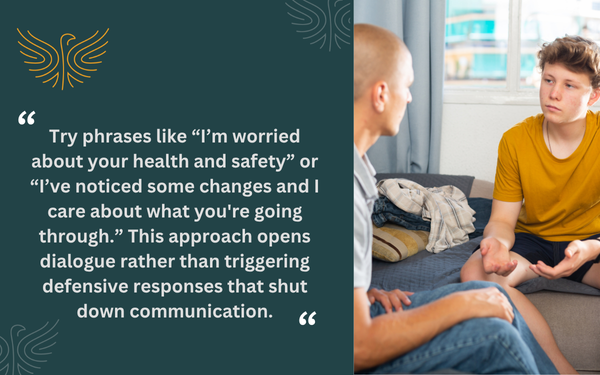As a parent, you want the best for your children. Yet, it can be alarming to discover that your child is using drugs. You might feel overwhelmed, angry, scared, and more - all of which are completely normal to feel.
However, it’s important that you address your concerns from a compassionate and caring standpoint. So, how should you approach this situation? Keep reading to learn more about how you can support your teen and guide them toward a healthier life.
_______________________________________________________
Signs of Teen Drug Use
Maybe you have your suspicions. Or perhaps you found illegal drugs when cleaning up their personal belongings. Whatever the case may be, here are a few tell-tale signs that your teen may be struggling with drug use:
- They’ve suddenly changed friend groups.
- Their eating habits, sleeping patterns, physical appearance, financial situation, or school performance have changed.
- They’ve been engaging in more irresponsible behavior, exhibiting a lack of judgment, and a lack of interest in hobbies or activities they used to love or enjoy.
- They have drug paraphernalia in their room.
- They have drug or medicinal containers, despite having no illness.
You might also notice they’re more moody than usual and have withdrawn from the family. They may also have increased secrecy, indicating they could be hiding their drug use.
_______________________________________________________
Why Teens Use Drugs
Various factors can play into drug use or misuse. The most common risk factors include:
- A family history of addiction or substance use
- Mental health conditions (such as anxiety or depression)
- A history of traumatic events
- Low self-esteem
- Peer pressure or wanting to belong/fear of being rejected
- Family conflict or trauma
In some cases, they may merely be interested due to others’ use. Ultimately, understanding “why” can help inform your response and ensure you’re recognizing and addressing any root causes.
_______________________________________________________
How to Talk to Your Teen About Their Drug Use
So, how should you approach this conversation? Here are our top tips:
Tip #1: Choose an appropriate time and setting.
When your teen is heading out the door is probably not an ideal time and may lead to more conflict. Instead, find a calm, private space with no distractions where your teen feels safe to open up. Avoid having this conversation when either of you is stressed, rushed, or emotional from a recent incident. Turn off your phone and TV to show that this conversation deserves your full attention. Choose a neutral location rather than their bedroom, which might feel invasive, or public spaces where they could feel embarrassed.
Tip #2: Use empathy, care, and concern.
Lead with love rather than accusation by using “I” statements that express your feelings without attacking their character. Try phrases like “I’m worried about your health and safety” or “I’ve noticed some changes and I care about what you're going through.” This approach opens dialogue rather than triggering defensive responses that shut down communication.

Tip #3: Listen more than you speak.
Give your teen space to talk about what they’re experiencing without immediately jumping to solutions or lectures. Try asking open-ended questions like “Can you help me understand what's been happening?”
Tip #4: Stay calm and avoid judgment.
Show love and concern rather than just disappointment, even if you're feeling scared or angry inside. Remember that your teen is likely already feeling shame and fear about their situation. Your reaction in this moment will determine whether they continue to confide in you or hide their struggles moving forward.
Tip #5: Avoid punishment, especially without understanding.
Focus first on understanding the scope of the issue and getting appropriate help rather than rushing to consequences. Punishment without addressing underlying causes rarely resolves substance use problems and may worsen the situation.
Tip #6: Don’t ignore the problem.
Hoping drug use will blow over on its own often allows dangerous behaviors to escalate. Early intervention is important for preventing more serious consequences and getting your teen the support they need. While understanding is important, make sure to follow up the discussion or end the discussion with potential action steps, including getting professional help.
_______________________________________________________
When and How to Seek Professional Help
Recognizing when your teen needs professional help isn’t easy, but some warning signs signal it’s time to go beyond family conversations. Watch for:
- Continued substance use despite serious consequences, such as legal trouble, academic issues, or health problems — a sign your teen may have lost control.
- Signs of physical dependence including:
- Withdrawal symptoms when not using
- Needing larger amounts to feel the same effects (increased tolerance)
- Being unable to stop despite wanting to
- Co-occurring mental health issues, such as:
- Depression
- Anxiety
- Sudden or dramatic behavioral changes
These red flags often indicate that specialized, professional care is needed to address both substance use and underlying mental health concerns.
Fortunately, there are treatment options to fit different needs. Outpatient counseling enables teens to stay at home and attend school while receiving regular therapy—ideal for early intervention. Intensive outpatient programs provide more structured support with multiple therapy sessions and family involvement. For severe cases, residential treatment offers 24/7 care in a safe, therapeutic environment—especially when outpatient care hasn’t worked or home life isn’t stable.
If you have questions regarding rehab for your teen, our team at Freedom Recovery Centers (FRC) is ready to answer them. Call us at 804-635-3746 or fill out our online form to learn more. We can help you and your family get back on the right track, free from substance use.
.svg)






.svg)

.svg)



.svg)
